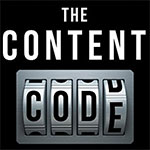As Charles Bohannan says, content is the single most important and sought-after commodity on the web. But, what do we mean by the term content in the content marketing context?
 Although I have already attempted to provide a broad definition of content, would be more helpful if we make a more specific definition of content in content marketing. As here the term content often refers to the digital web content.
Although I have already attempted to provide a broad definition of content, would be more helpful if we make a more specific definition of content in content marketing. As here the term content often refers to the digital web content.
Rahel Bailie’s definition of content
Rahel Bailie defines content as contextualized data, but as Rachel Lovinger comments on her own definition, it’s a little poetic to consider such explanations as practical definitions of content.
Halvorson’s definition of content in content marketing
Christina Halvorson in her article about the content strategy refers to the term in a very generic sense: the web is content and content is the web.
Odden Lee’s definition
Odden Lee defines the content in a similar way: content is the information and experience(s) directed towards an end-user or audience.
If you would like to adopt a general yet helpful definition of content, I would recommend Lauren Pope‘s definition in her article titled what is content anyway:
Information or an idea that means something to a person in a specific time and place.
Although there are many definitions of the content and, even more, definitions for digital content I’d rather make a clear distinction between the narrow definition of digital content and the broader definition:
Digital Content viewed narrowly, includes texts, images, sounds or anything that is published via digital media and can be consumed directly by the user. However, in a broader sense, any type of content that exists in the form of digital data can be considered as content.
According to the latter definition, even a like or dislike on a published post in the social media can be considered as user generated content.
In my blog, I use the term digital content with the narrower meaning unless otherwise specified.
Content, in my opinion, is somehow similar to the creativity: we understand it as we see it, but we are not able to define it. So it may be more useful to identify and understand content-related terms in content marketing instead of insisting on proposing a general definition for content.
These are some of the content-related terms I am going to describe in future articles. Understanding of the following terms would be crucial for devising a practical content marketing strategy:
- Evergreen Content
- Adaptive Content
- Content Farm
- Intelligent Content
- Interactive content
- Retired Content
- Micro-moment Solution Content
- User Generated Content
- Cornerstone Content
- Curated Content
- Thin Content






